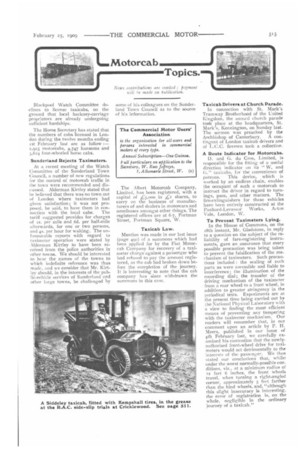Motorcab Topics.
Page 13

If you've noticed an error in this article please click here to report it so we can fix it.
News contributions are invited : payment wi1.! be made on bublication.
Blackpool Watch Committee declines to license taxicabs, on the ground that local hackney-carriage proprietors are already undergoing sufficient hardships.
The Home Secretary has stated that the numbers of cabs licensed in London during the twelve months ending ist February last are as follow :— 2,925 motorcabs, 4,747 hansoms and 3,624 four-wheeled horse cabs.
Sunderland Rejects Taximeters.
At a recent meeting of the Watch Committee of the Sunderland Town Council, a number of new regulations for the control of motorcab traffic in the town were recommended and discussed. Alderman Kirtley stated that he believed that there was no town out of London where taximeters had given satisfaction; it was not proposed, he said, to have them n in con nection with the local cabs. The tariff suggested provides for charges of is. per mile and .6d. per half-mile afterwards, for one or two persons, and 45. per hour for waiting. The unfavourable reports with regard to taximeter operation were stated by Alderman Kirtley to have been received from the police authorities in other towns. We should be interested to hear the names of the towns to which indefinite reference was thus made, and we consider that Mr. Kirtley should, in the interests of the public-vehicle services of Sunderland and other large towns, be challenged by
some of his colleagues on the Sunderland Town Council as to the source of his information.
The Albert Motorcab Company, Limited, has been registered, with a capital of 4.3,000 in Li shares, to can-y on the business of manufacturers of and dealers in motorcars and omnibuses amongst other things. The registered offices are at 6-7, Portman Street, Portman Square, W.
Taxicab Law.
Mention was made in our last issue (page 490) of a summons which had been applied for by the Fiat Motorcab Company for recovery of a taximeter charge against a passenger who had refused to pay the amount registered, as the cab had broken down before the completion of the journey. It is interesting to note that the cab company has since withdrawn the summons in this case. Taxicab Drivers at Church Parade.
In connection with St. Mark's Tramway Brotherhood of the United Kingdom, the annual church parade took place at the headquarters, St. Mark's, Kennington, on Sunday last. The sermon was preached by the Archbishop of Canterbury. A contingent of London taxicab drivers and of L.C.C. firemen took a collection.
A Route Indicator for Motorcabs.
D. and G. du Cros, Limited, is responsible for the fitting of a useful direction indicator on its " W. and C." taxicabs, for the convenience of patrons. This device, which is worked by an endless chain, enables the occupant of such a motorcab to instruct the driver in regard to turnings, pace, and other matters. The fire-extinguishers for these vehicles have been entirely constructed at the Panhard-Levassor Works, Acton Vale, London, W.
To Prevent Taximeters Lying.
In the House of Commons, on the 18th instant, Mr. Gladstone, in reply to a question on the subject of the reliability of fare-registering instruments, gave an assurance that every possible precaution was being taken to prevent the falsification of the mechanism of taximeters. Such precautions included : the sealing of such parts as were accessible and liable to interference; the illumination of the recording dial ; the transfer of the driving mechanism of the taximeter from a rear wheel to a front wheel, in addition to greater stringency in the periodical tests. Experiments are at the present time being carried out by the National Physical Laboratory with a view to finding the most efficient means of preventing any tampering with the taximeter mechanism. Our readers will remember that, in our comment upon an article by P. H. Meers, published in our issue of 4th February last, we carefully examined his contention that the newlyauthorised front-wheel drive for taximeters would act detrimentally to the interest!.; of the passenger. We then stated our conclusions that, whilst under the worst normally-possible conditions, viz., at a minimum radius of 12 feet 6 inches, the front wheels travel, when turning a right-angled corner, approximately s feet farther than the hind wheels, and, "although this slight inaccuracy is interesting, the error of registration is, on the whole, negligible in the ordinary journey of a taxicab."






























